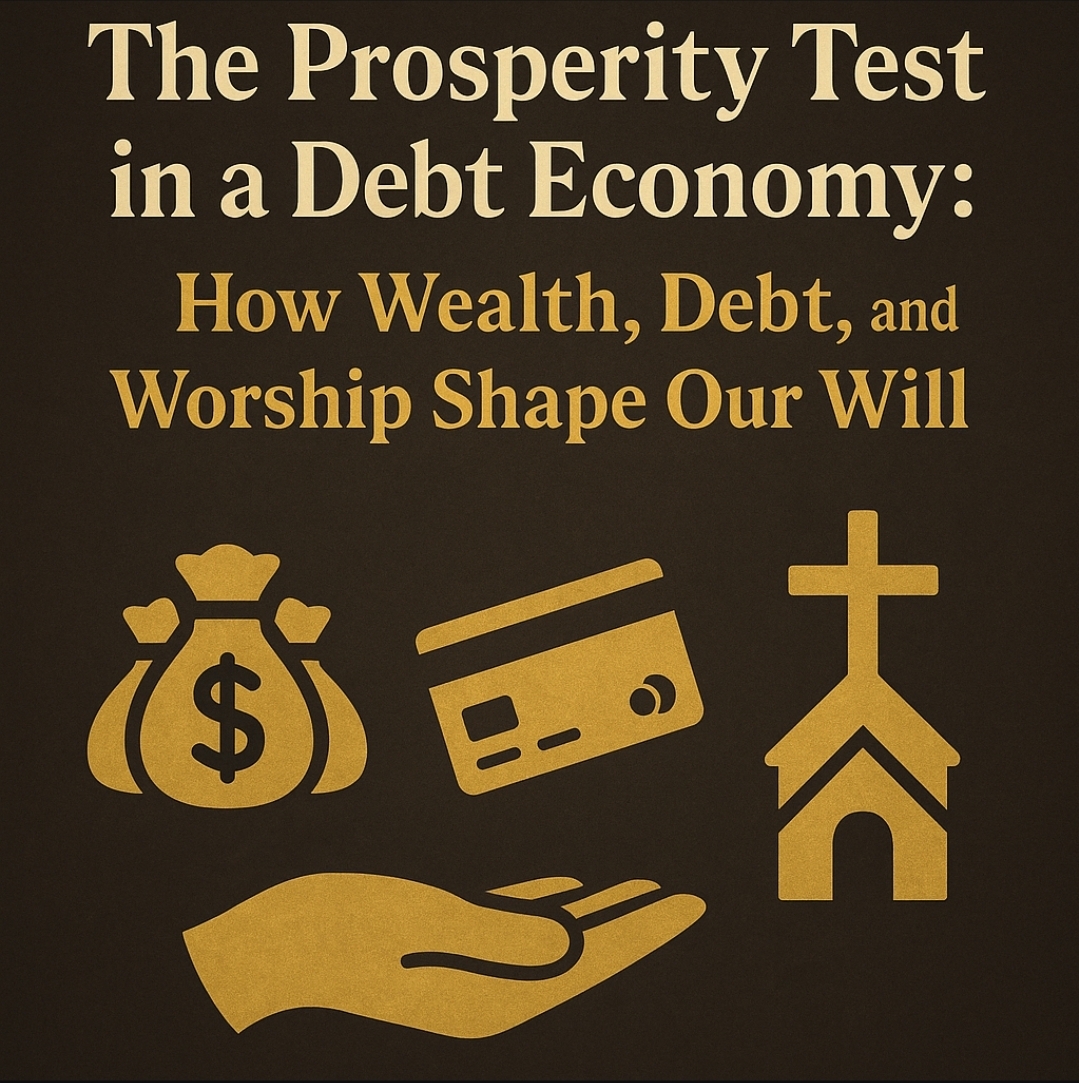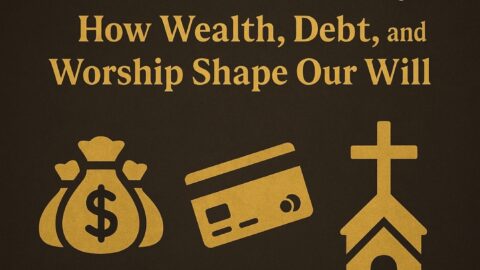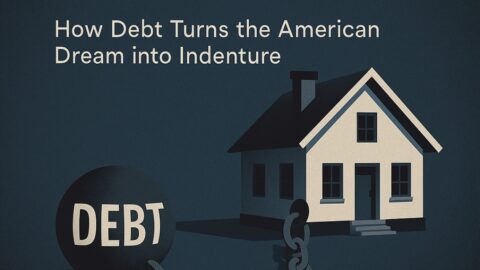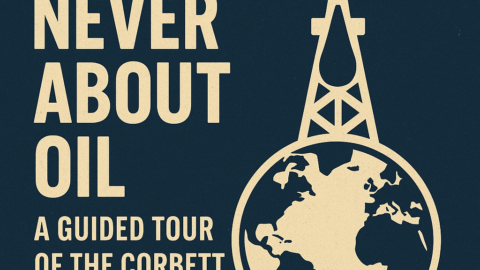“My greatest fear is that they cannot stand wealth.” —Brigham Young
Prosperity is not a finish line; it’s an exam. In a debt-driven culture where status is measured by payments and posts, wealth easily becomes a leash. The more our identity is tied to lifestyle and the more our cash-flow is pre-spent, the easier it is for fear or convenience to steer our conscience. Read through the biblical lens of Revelation—where buying and selling can be coerced—debt-fed consumption subtly trains people to trade allegiance for access. The antidote isn’t romanticized poverty; it’s stewardship: modest living, low leverage, generous hearts, and thick communities that make obedience affordable.
This essay unpacks the spiritual, psychological, and economic mechanics of that claim—and then offers a practical readiness plan for households, churches, and neighborhoods.
Why Prosperity Is the Harder Test
Scripture repeatedly warns that abundance can seduce (Deut. 8; Prov. 30:8-9; Luke 12). Persecution clarifies loyalties; prosperity blurs them. Young’s worry wasn’t wealth itself but forgetfulness—the drift from worship to self-sufficiency, from covenant to convenience. In modern terms:
- Scarcity tests courage.
- Affluence tests worship.
When the bills are paid and the pantry is full, “need” whispers less loudly than “more.” Gratitude hardens into entitlement. That’s the spiritual danger of comfort: it feels like competence.
How the Modern Debt Machine Works (and Works on Us)
Our grandparents bought after saving; we often save after buying. Three cultural flywheels make that normal:
- Easy credit: Revolving lines, BNPL buttons, 84-month car notes. Debt becomes the default interface with the future.
- Engineered desire: Advertising, influencer culture, and status games convert wants to needs and “identity” into a shopping cart.
- Financialized basics: Housing, education, and healthcare costs push families toward lifetime leverage.
This isn’t just math—it’s formation. Debt shapes the soul.
- Fixed costs = fixed fears. High monthly nut? You’ll think twice before taking stands that risk a job, contract, or platform.
- Identity on display. When self-worth is tied to lifestyle, conscience feels unaffordable.
- Outsourced resilience. If every margin is rented from a system, saying “no” threatens access to buying and selling.
That last verb pair—buying and selling—is why Revelation’s imagery resonates in a digital economy. You don’t have to speculate on timelines to grasp the principle: systems that control commerce can pressure conscience.
The “Mark” as a Pattern of Coerced Access
Without pinning dates or names, Revelation’s “mark” functions as a symbol of allegiance enforced through economic gates. Every age can instantiate that pattern with its own tools:
- banking blacklists and platform bans
- speech rules embedded in payment processors or app stores
- travel or work tied to digital passes
- programmable currencies that throttle “disfavored” purchases
You don’t need a sci-fi implant for this to be real; a handful of private/public chokepoints can produce the same effect: access in exchange for compliance. Who is most vulnerable? Those whose lives are most entangled—financially and socially—with those chokepoints.
Why Debt + Materialism Lowers Moral Resistance
Spiritually: Debt can make mammon feel like master. When paying Caesar depends on pleasing Caesar (or his algorithm), we’re tempted to “worship” by compliance.
Psychologically:
- Loss aversion—people fear losing income/status more than they value truth.
- Cognitive dissonance—we rename compromises “prudence.”
- Conformity pressure—if your network prizes the lifestyle debt bought, you’ll protect the story.
Economically: High fixed costs mean a high “price of saying no.” If one employer, one platform, or one processor can cut you off, courage is expensive.
Flip the script and you get the profile of those most able to resist coercion: low debt, modest needs, multiple channels of provision, and a community that carries each other. Minimalism here isn’t aesthetic—it’s moral resilience.
Objections—and the Better Balance
- “So being rich is sinful?” No. Wealth is a tool and a trust. Scripture honors righteous stewards (Joseph, Lydia). The danger isn’t assets; it’s idolatry.
- “Minimalism guarantees virtue?” Also no. You can be austere and proud. The point is not ascetic heroics but freedom to obey.
- “Debt is sometimes necessary.” True, for many families. The aim is direction (less leverage, more margin), not guilt.
The test is worship. Do our financial habits make obedience easier—or harder?
A Household Readiness Plan (Morally and Practically)
A. Re-aim the heart
- Daily gratitude & confession. Start prayers with “All I have is borrowed; teach me to steward, not clutch.”
- Sabbath honestly. One day a week without buying, hustling, or branding. Rest dethrones mammon.
- Give first. Tithe or choose a percent. Generosity is spiritual physiotherapy; it keeps wealth from calcifying the soul.
B. Shrink the leverage
- Kill high-interest debt. Snowball or avalanche, but make a visible plan and celebrate each payoff.
- Cap lifestyle creep. If income rises, let spending lag. Bank the gap for savings and charity.
- Cut fixed costs. Refi or downsize housing, drive paid-off cars, prune subscriptions, self-insure deductibles you can absorb.
C. Build margin and alternatives
- Reserves: 3–6 months of expenses; pantry rotation; basic tools. Slack = courage.
- Side income: a trade, micro-business, tutoring, repairs—anything that decouples your daily bread from a single gatekeeper.
- Local supply webs: meet your butcher, farmer, mechanic; join co-ops; buy from neighbors. Money is a vote.
- Skills over stuff: first aid, gardening, accounting, coding, small-engine repair—skills can’t be deplatformed.
D. Harden your information immune system
- Media hygiene: verify before sharing; read opposing arguments; practice “wait an hour” on outrage.
- Teach the kids: budgeting, compound interest, the difference between price and value, and why promises matter more than vibes.
E. Covenant practices
- Family economy: shared chores, business projects, and giving decisions. Make stewardship normal dinner talk.
- Debt vows: a family rule like “no consumer debt,” or “all purchases >$X wait 7 days,” or “cars paid in cash.”
A Church & Community Playbook
- Financial discipleship as catechesis. Budget classes, debt-free coaching, benevolence funds with accountability, and testimonies that celebrate contentment more than upgrades.
- Benevolence with dignity. Short-term aid tied to mentoring, job networks, and skills training.
- Parallel institutions. Homeschool co-ops, classical schools, trade guilds, credit unions, medical sharing, food pantries—small but real alternatives.
- Mutual-aid compacts. “No one in this congregation loses housing alone.” Put it in writing; fund it transparently.
- Economic peacemaking. Mediation ministry to keep disputes out of predatory systems and to protect reputations.
- Civic spine. Members run for school boards and councils on process reforms: single-subject bills, public contracts, hard sunsets, no censorship-by-proxy, warrants for data, competitive bidding. Guardrails protect everyone’s agency.
Signs You’re Passing the Test
- You can say no to a lucrative ask that violates conscience.
- Your giving percentage rises faster than your lifestyle.
- Your household could lose a platform, job, or card processor and still eat, work, and worship.
- You feel gratitude more often than envy.
- “We can’t afford that” means “we won’t yoke our future to that.”
Liturgy of a Free People (a sample weekly rhythm)
- Sunday: Worship, rest, family meal; phones away; plan giving.
- Monday: Budget review; pay a little extra toward principal.
- Tuesday: Skill night (repair, cooking from scratch, coding).
- Wednesday: Community night (small group, neighbor check-in).
- Thursday: Business night (side hustle or learning hour).
- Friday: Hospitality on a budget; invite someone new.
- Saturday: Work with hands; stock pantry; nature time.
Rinse, repeat, adjust. Formation is slow, but compounding is real—in money and in virtue.
Conclusion: Make Conscience Affordable
Young’s fear wasn’t that saints would suffer; it was that they would succeed and forget. In our age, forgetting looks like frictionless payments, frictionless feeds, and a frictionless conscience—until a crisis adds friction back at the gate to buying and selling. The wise answer is not panic or performative poverty. It is to make conscience affordable:
- Live one rung lower than you can.
- Owe less than most do.
- Give more than you feel.
- Build skills and friendships no platform can cancel.
- Teach your children that worth is received, not purchased.
Prosperity is a tool; debt is a master. Worship God, not mammon. Choose a quieter wealth—covenant, contentment, community—and you’ll be free enough to stand when standing costs.







